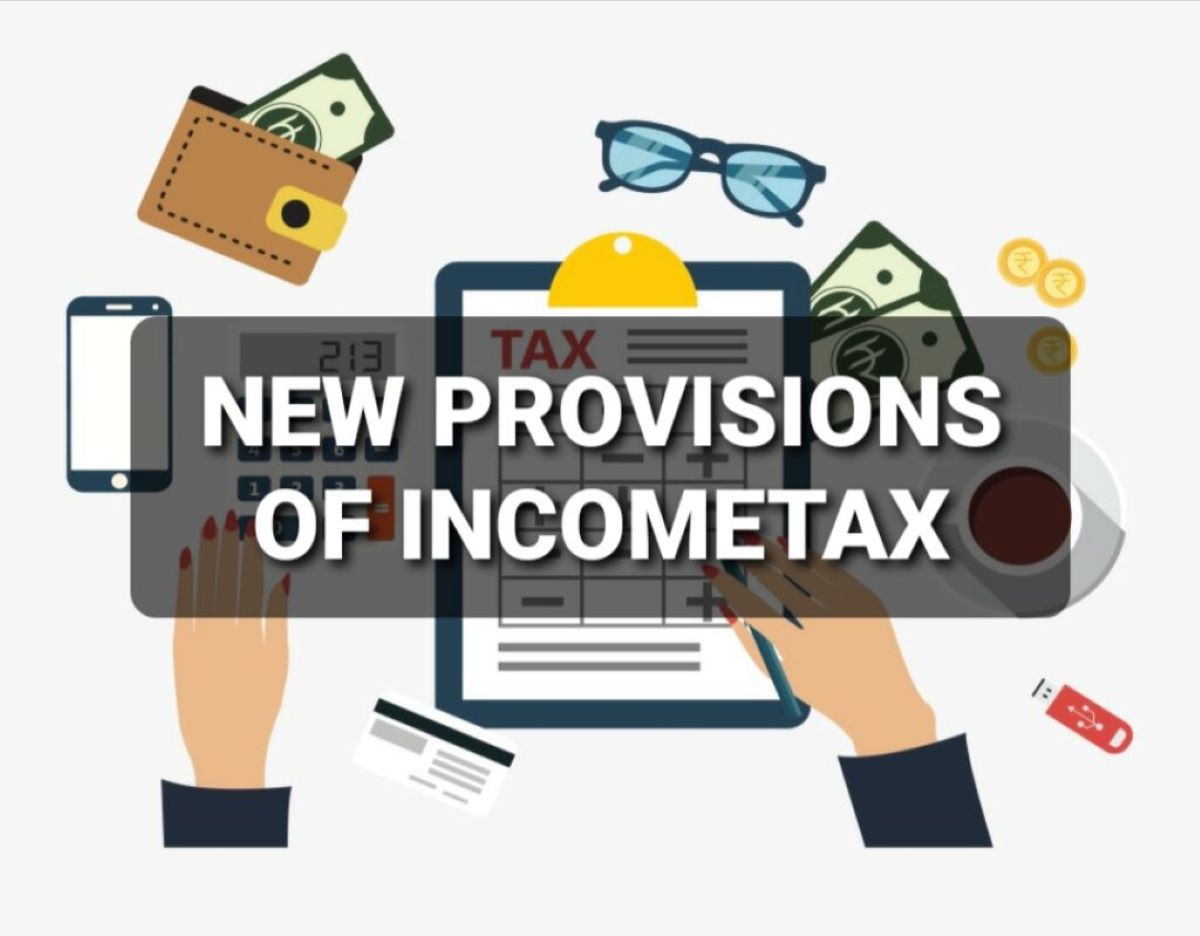

Finance
How Does Income Tax Work For Remote Employees
Published: November 2, 2023
Learn how income tax works for remote employees and its implications on their finances. Get a clear understanding of remote taxation rules and regulations.
(Many of the links in this article redirect to a specific reviewed product. Your purchase of these products through affiliate links helps to generate commission for LiveWell, at no extra cost. Learn more)
Table of Contents
- Introduction
- Definition of Remote Employees
- Income Tax Basics for Remote Employees
- Determining Tax Residency for Remote Employees
- Taxation on Remote Workers’ Earnings
- Implications of Remote Work on Deductions and Credits
- State and Local Income Tax Considerations for Remote Employees
- Tax Filing Requirements and Deadlines for Remote Employees
- Withholding and Paying Taxes as a Remote Employee
- Tax Planning and Strategies for Remote Employees
- Compliance and Reporting Obligations for Remote Employees
- Conclusion
Introduction
Welcome to the world of remote work, where employees have the flexibility to work from the comfort of their homes or any location of their choice. The rise of technology has paved the way for remote work to become more prevalent, offering countless benefits such as increased productivity, reduced commuting time, and improved work-life balance. However, with this newfound freedom comes the need to understand the intricacies of income tax and how it applies to remote employees.
In this article, we will delve into the nuances of income tax for remote employees, exploring key concepts such as tax residency, taxation on remote workers’ earnings, deductions and credits, as well as compliance and reporting obligations. Whether you are a remote employee or an employer managing remote teams, this article will equip you with the knowledge needed to navigate the complex world of income tax for remote work.
Remote work is a dynamic and evolving landscape, and as such, the regulations surrounding income tax for remote employees can vary depending on your jurisdiction. It is crucial to consult with a tax professional or utilize reputable online resources that provide up-to-date information specific to your location.
Now, let’s dive into the details and demystify the world of income tax for remote employees.
Definition of Remote Employees
Before we delve into the details of income tax for remote employees, it is essential to understand who qualifies as a remote employee. In simple terms, a remote employee is an individual who works outside of a traditional office setting, typically from home or another location of their choice.
Remote work has gained widespread popularity in recent years, fueled by advancements in communication technology and a shift towards more flexible work arrangements. It offers employees the freedom to work from anywhere while still contributing to their organization’s success.
Remote employees can be categorized into different types based on their working arrangements:
1. Full-time remote employees: These individuals work exclusively from a remote location and are not required to report to a physical office. They may be employed by companies that are fully remote or have remote work policies in place.
2. Part-time remote employees: Part-time remote employees split their time between working remotely and working from a physical office. They may have specific days or hours dedicated to remote work and follow a schedule agreed upon with their employer.
3. Freelancers and independent contractors: Freelancers and independent contractors are self-employed individuals who work remotely on a project basis. They have more control over their work schedule and often work with multiple clients simultaneously.
4. Digital nomads: Digital nomads are individuals who have embraced a location-independent lifestyle, leveraging technology to work remotely while constantly traveling and exploring new destinations.
It is worth noting that the distinction between remote employees and traditional office-based employees may vary depending on local labor laws and regulations. Therefore, it is crucial to consult with legal professionals or review national and regional labor laws to determine the specific criteria for remote employment in your jurisdiction.
Now that we have established the definition of remote employees, let us delve into the intricacies of income tax for these individuals, including how tax residency is determined and the implications on the taxation of their earnings.
Income Tax Basics for Remote Employees
When it comes to income tax for remote employees, the fundamental principles remain the same as for traditional office-based workers. Income tax is a mandatory tax imposed by the government on individuals’ earnings, including wages, salaries, bonuses, and freelance income. The specific rules and rates may vary depending on the jurisdiction, but there are crucial concepts that all remote employees should understand.
Taxable Income: Taxable income refers to the amount of income that is subject to taxation after accounting for any allowable deductions or exemptions. It includes not only the base salary but also any additional income such as commissions, bonuses, or stock options.
Tax Withholding: As a remote employee, your employer may withhold taxes from your paycheck on your behalf. This means that a portion of your earnings is automatically deducted and remitted to the tax authorities. The amount of tax withheld depends on factors such as your income level, tax bracket, and the number of allowances you claim on your W-4 form.
Filing Status: Remote employees, like all taxpayers, must determine their filing status. The filing status determines the tax rates and deductions applicable to your tax return. Common filing statuses include single, married filing jointly, married filing separately, and head of household.
Deadlines: It is important for remote employees to be aware of tax filing deadlines. In most jurisdictions, the deadline for individual tax returns is typically April 15th, but there may be variations depending on the specific country or region. Failing to file on time can result in penalties and interest charges.
Tax Forms: Remote employees will need to complete and submit tax forms to accurately report their income and claim any applicable deductions or credits. The specific forms required may vary depending on the jurisdiction, but commonly used forms include the W-2 for employees and the 1099 form for freelancers or independent contractors.
Understanding these income tax basics is crucial for remote employees to ensure compliance with tax laws and to maximize their tax benefits. In the next sections, we will explore further considerations for remote employees, including tax residency determination, taxation on earnings, deductions and credits, and compliance obligations.
Determining Tax Residency for Remote Employees
One of the key factors in determining how income tax applies to remote employees is their tax residency status. Tax residency determines which country or jurisdiction has the right to tax an individual’s worldwide income. It is important for remote employees to understand the rules governing tax residency to ensure proper compliance with tax laws and avoid potential double taxation.
The determination of tax residency can vary depending on the local tax laws and the specific bilateral tax treaties in place between countries. However, there are common factors that are typically considered when establishing tax residency:
Physical Presence: The amount of time a remote employee spends in a particular country or jurisdiction can be a significant factor in determining tax residency. Many countries have specific rules regarding the number of days an individual must spend within their borders to qualify as a tax resident.
Permanent Home or Domicile: In some cases, tax residency can be established based on the presence of a permanent home or domicile in a particular country. This could be the place where the remote employee owns or rents a property and where their personal and economic ties are strongest.
Economic or Business Ties: The presence of significant economic or business ties, such as having a permanent job or business in a specific country, can also impact tax residency determination. This includes factors such as having a local employer, conducting business activities, or generating substantial income within a jurisdiction.
It is essential for remote employees to consult with tax professionals or review the tax laws of their country of residence and the country where their employer is located, as well as any relevant tax treaties, to determine their tax residency status. This will help ensure accurate reporting of income and compliance with tax obligations.
In situations where a remote employee is considered a tax resident of multiple jurisdictions, the relevant tax treaties can help determine which country has the primary right to tax their income. Bilateral tax treaties often provide mechanisms to prevent or mitigate double taxation, allowing for the avoidance of paying taxes on the same income to multiple countries.
By understanding the criteria for tax residency and navigating the complex rules and treaties, remote employees can determine their tax obligations properly and take advantage of any available tax benefits or credits, ensuring both compliance and tax optimization.
Taxation on Remote Workers’ Earnings
As a remote worker, understanding how your earnings are taxed is crucial for proper compliance and financial planning. The tax treatment of remote workers’ earnings can vary depending on factors such as tax residency, the jurisdiction of the employer, and any applicable tax treaties. Let’s explore some key considerations:
Taxation in Country of Residence: In most cases, remote workers’ earnings are subject to income tax in the country where they are tax residents. This means that you are required to report and pay taxes on your worldwide income, regardless of where your employer is located. The income tax rates and brackets may vary depending on the local tax laws.
Taxation in Country of Employment: In certain situations, remote workers may also be liable to pay income tax in the country where their employer is based. This can happen if there is a presence or a permanent establishment of the employer in that jurisdiction. The tax liability in the country of employment may be offset through tax credits or exemptions, depending on the applicable tax treaties.
Double Taxation Relief: To avoid double taxation on the same income, many countries have entered into bilateral tax treaties with provisions for the avoidance of double taxation. These treaties typically provide mechanisms such as tax credits or exemptions to alleviate the tax burden on remote workers. It is important to understand the specific provisions of the tax treaty between your country of residence and the country of employment to ensure you take advantage of any available relief.
Social Security and Payroll Taxes: Alongside income tax, remote workers may also be subject to social security or payroll taxes based on their country of residence. These taxes contribute to social welfare programs, such as healthcare, retirement, or unemployment benefits. The specific rules and rates for social security and payroll taxes vary by country.
Self-Employment Tax: If you are a remote worker operating as a freelancer or independent contractor, you may be responsible for paying self-employment taxes. Self-employment taxes typically include both the employee and employer portions of Social Security and Medicare taxes. It is important to understand the self-employment tax rules in your country to ensure proper compliance.
It is recommended that remote workers consult with tax professionals or utilize online resources to understand the specific tax obligations and any available tax benefits in their country of residence and the country where their employer is located. By understanding the taxation rules and leveraging applicable tax treaties, remote workers can ensure compliance with tax laws, optimize tax planning, and minimize their tax liabilities.
Implications of Remote Work on Deductions and Credits
The nature of remote work presents unique opportunities and considerations when it comes to deductions and tax credits. As a remote worker, you may be eligible for certain deductions and credits that can help reduce your tax liability. Let’s explore some key implications:
Home Office Deduction: If you use a designated area in your home exclusively for work, you may be eligible to claim a home office deduction. This deduction allows you to deduct a portion of your mortgage or rent, utilities, and other expenses directly related to your home office. The criteria for qualifying for this deduction varies by jurisdiction, so it is important to familiarize yourself with the specific rules and keep accurate records of your home office expenses.
Business Expenses: As a remote worker, you may have additional business-related expenses that are deductible. This can include expenses such as computer equipment, software, office supplies, and professional development courses. Keep track of these expenses throughout the year and consult with a tax professional to determine which expenses are eligible for deduction.
Travel and Transportation: Remote workers who occasionally travel for work-related purposes may be able to deduct travel and transportation expenses. This can include the cost of accommodations, meals, transportation, and other incidental expenses. However, it is important to differentiate between personal and business-related travel expenses and ensure compliance with local tax laws.
Tuition and Education Credits: If you pursue further education or professional development courses relevant to your work as a remote employee, you may be eligible for certain tax credits or deductions. These credits can help offset the cost of tuition and course materials, providing financial relief while enhancing your skills and knowledge.
Retirement Contributions: Remote workers, particularly those who are self-employed, have the opportunity to contribute to retirement accounts such as IRAs (Individual Retirement Accounts) or SEP-IRAs (Simplified Employee Pension IRAs). These contributions may be tax-deductible and can provide long-term tax advantages and financial security.
Healthcare Expenses: Remote workers who are self-employed and pay for their health insurance premiums may be eligible for a deduction. Additionally, specific healthcare-related expenses, such as medical and dental expenses, may be deductible if they exceed a certain percentage of your income. Consult with a tax professional to determine the eligibility and calculation of these deductions.
It is important to note that deductions and credits can vary depending on the jurisdiction and individual circumstances. Keeping detailed records, consulting with a tax professional, and staying updated on tax laws and regulations are crucial to maximize deductions and credits while ensuring compliance.
By taking advantage of available deductions and credits, remote workers can reduce their overall tax liability and potentially increase their tax refunds, allowing them to reap the financial benefits of their remote work arrangement.
State and Local Income Tax Considerations for Remote Employees
For remote employees, state and local income tax considerations can add an additional layer of complexity to their tax obligations. Unlike traditional office-based employees who typically pay income tax in the state where their employer is located, remote workers may have different state and local tax obligations depending on their specific circumstances. Here are some key considerations:
Nexus and Withholding: Nexus refers to the connection or presence an employer has in a particular state that may trigger tax obligations for remote employees. If an employer has a physical presence, such as an office or employees, in a state, they may be required to withhold state income tax on behalf of remote employees residing in that state. Remote employees should verify with their employer whether state income tax is being withheld and ensure accurate reporting of their income.
Multi-State Residency: Remote workers who reside in one state but perform work for an employer located in another state may face state tax obligations in both jurisdictions. This can result in the need to file income tax returns in both states and potentially pay taxes in both places. The specific rules governing multi-state taxation vary by state, and it is essential to consult with tax professionals familiar with the tax laws of both states involved.
Reciprocity Agreements: Some states have reciprocity agreements in place where they agree to exempt residents from paying income tax in the state where their employer is located. These agreements are intended to prevent double taxation and simplify tax obligations for employees. It is crucial to understand if your state of residence has a reciprocity agreement with the state where your employer is located and how it impacts your tax liabilities.
State and Local Deductions and Credits: In addition to income tax considerations, remote workers should also be aware of any state-specific deductions or credits that may be available to them. Each state sets its own rules regarding deductions and credits, which can vary widely. Researching and understanding these state and local provisions can help maximize tax benefits and reduce overall tax liabilities.
State and Local Filing Requirements: Remote workers should be familiar with the state and local filing requirements of the jurisdictions involved. This includes knowing the deadlines for filing state income tax returns, any specific forms required, and any additional reporting obligations imposed by the state or local tax authorities.
It is crucial for remote employees to thoroughly understand the state and local income tax considerations that apply to their specific situation. Consulting with a tax professional who is knowledgeable about both federal and state tax laws can provide valuable guidance and ensure compliance with these additional tax obligations.
By staying informed and fulfilling their state and local income tax obligations, remote employees can navigate the complexities of multi-state taxation and manage their tax liabilities effectively.
Tax Filing Requirements and Deadlines for Remote Employees
As a remote employee, understanding the tax filing requirements and deadlines is crucial to ensure compliance with tax laws and avoid penalties. The specific requirements and deadlines can vary depending on your jurisdiction and individual circumstances. Here are some key considerations:
Federal Tax Filing: Remote employees, like all taxpayers in the United States, are required to file their federal income tax returns annually. The deadline for filing federal tax returns is typically April 15th, unless it falls on a weekend or a holiday, in which case it is extended to the next business day. It is important to file your federal tax return on time to avoid penalties and interest charges.
State Tax Filing: In addition to federal tax obligations, remote employees may also have state tax filing requirements. The specific rules and deadlines for state tax returns vary by state. Some states have the same deadline as the federal tax return, while others may have different deadlines. It is important to consult the tax laws of your state of residence to determine the applicable deadline for filing your state tax return.
Multi-State Filing: Remote employees who work for employers located in different states or reside in one state but perform work in another may be required to file tax returns in multiple states. This can add complexity to the tax filing process, as each state may have its own filing requirements and deadlines. It is crucial to understand the rules and regulations of each state involved and consult with a tax professional to ensure proper compliance.
Extensions: If you are unable to file your tax return by the deadline, you may request an extension. An extension allows you additional time to file your return without incurring penalties. However, it is important to note that an extension does not grant additional time to pay any tax owed. If you expect to owe taxes, it is advisable to make an estimated payment by the original deadline to avoid interest charges.
Foreign Tax Filing: Remote employees who are tax residents of a foreign country may have additional tax filing obligations in that country. Each country has its own tax laws and deadlines, and it is important to understand and fulfill these requirements to maintain compliance.
It is highly recommended to keep accurate records of your income, expenses, and other relevant tax information throughout the year. This will make the tax filing process much smoother and help ensure accurate reporting of your income and deductions.
Remember, tax laws are subject to change, and it is important to stay informed about any updates or changes that may affect your tax filing requirements and deadlines. Consulting with a tax professional can provide valuable guidance and ensure that you meet all your tax obligations as a remote employee.
Withholding and Paying Taxes as a Remote Employee
As a remote employee, it is important to understand the withholding and payment processes for your taxes to ensure timely and accurate compliance. Here are key considerations for withholding and paying taxes:
Wage Withholding: Remote employees may have income taxes withheld from their paychecks by their employers. This withholding is based on the information provided on your W-4 form, including your filing status and the number of allowances claimed. It is crucial to review and update your W-4 form to ensure the appropriate amount is withheld, as significant over or under-withholding can impact your tax liability come tax filing season.
Estimated Quarterly Payments: If your employer does not withhold taxes from your paycheck, or if you have additional income not subject to withholding, you may be required to make estimated quarterly tax payments. This applies to remote employees who are self-employed or have significant freelance income. Estimated tax payments are designed to cover your tax liability throughout the year and are typically due on specific dates, such as April 15th, June 15th, September 15th, and January 15th. It is important to calculate and make these payments on time to avoid penalties and interest charges.
Self-Employment Tax: Remote employees who are self-employed or working as freelancers are subject to self-employment tax, which covers Social Security and Medicare contributions. The self-employment tax consists of both the employee and employer portions, as self-employed individuals are responsible for both. Calculating and paying self-employment tax is an essential part of tax compliance for remote workers with self-employment income.
Tax Payment Options: Remote employees have various options for paying their taxes, including electronic payments, credit or debit card payments, check or money order payments, and direct debit from a bank account. The specific payment options available may vary depending on your jurisdiction. It is important to choose a payment method that is secure, convenient, and timely to ensure your tax payments are made on schedule.
Tax Reporting and Documentation: Remote employees must keep accurate records of their income, expenses, and tax-related documents throughout the year. This includes pay stubs, W-2 forms, 1099 forms, receipts for business expenses, and any other forms or documentation relevant to their tax returns. Proper recordkeeping is essential for accurate reporting and to support any deductions, credits, or claims made on your tax return.
It is advisable to consult with a tax professional or utilize reputable online resources to understand the specific withholding and payment requirements for your jurisdiction and individual circumstances. By staying informed and fulfilling your tax withholding and payment obligations as a remote employee, you can ensure compliance and avoid potential penalties or interest charges.
Tax Planning and Strategies for Remote Employees
As a remote employee, strategic tax planning can help you optimize your tax situation and maximize your after-tax income. Here are some tax planning strategies specifically tailored for remote employees:
Utilize Available Deductions and Credits: Take advantage of eligible deductions and credits to reduce your taxable income. This includes deductions for home office expenses, business-related expenses, education expenses, and healthcare costs. Additionally, explore tax credits for activities such as energy-efficient home improvements, adoption, or child and dependent care.
Maximize Retirement Contributions: Contributing to retirement accounts not only helps secure your financial future but also offers potential tax benefits. Consider contributing to tax-advantaged retirement accounts like IRAs, 401(k)s, or SEP-IRAs. These contributions may be tax-deductible, reducing your taxable income for the year.
Understand the Impact of State Tax Obligations: Being aware of your state tax obligations and the potential tax advantages or disadvantages of different states can significantly impact your overall tax liability. Consider the tax rates, deductions, and credits offered by different states, particularly if you have flexibility in choosing your state of residence as a remote employee.
Strategically Time Income and Expenses: Depending on your specific tax situation, it may be beneficial to strategically time when you receive income or incur deductible expenses. For example, if you anticipate being in a lower tax bracket next year, you may defer income to the following year. On the other hand, if you anticipate being in a higher tax bracket this year, you may consider accelerating deductible expenses into the current year.
Take Advantage of Tax-Advantaged Accounts for Healthcare: Explore options like Health Savings Accounts (HSAs) or Flexible Spending Accounts (FSAs) to set aside pre-tax dollars for eligible healthcare expenses. Contributions to these accounts can lower your taxable income and help you save on healthcare costs.
Investigate Tax Treaties and Expat Considerations: If you are a remote employee residing in a country different from your employer, investigate any tax treaties or agreements between your country of residence and your employer’s country. These may provide relief from double taxation or other tax benefits. Additionally, if you are an expat working remotely, consult tax professionals who specialize in expat tax matters to ensure proper compliance with both your home country and host country tax obligations.
Consult with a Tax Professional: Tax laws can be complex and subject to change. Seeking guidance from a tax professional who specializes in remote work or self-employment can help you navigate the intricacies of tax planning. They can provide personalized advice based on your unique circumstances, ensuring you are taking advantage of all available tax strategies and opportunities.
Remember, tax planning should be an ongoing process. Regularly review your tax situation, stay informed about changes to tax laws, and adapt your strategies as necessary. By implementing effective tax planning strategies, you can minimize your tax burden and make the most of your remote work arrangement.
Compliance and Reporting Obligations for Remote Employees
As a remote employee, it is essential to understand and fulfill your compliance and reporting obligations to ensure proper adherence to tax laws. Here are key considerations for compliance and reporting:
Accurate Income Reporting: Report all income earned as a remote employee accurately and completely on your tax return. This includes wages, salaries, bonuses, self-employment income, and any other sources of income. Keep track of all relevant income documents, such as W-2 forms or 1099 forms, and ensure they align with the income reported on your tax return.
Timely Filing of Tax Returns: File your tax returns on time to avoid penalties and interest charges. Be aware of the deadlines for both federal and state tax returns, as they could have different due dates. If you require additional time to file, consider requesting an extension, but remember that an extension only grants more time to file your return, not to pay any taxes owed.
Properly Disclose Remote Work Arrangements: Ensure that you accurately disclose your remote work arrangements on your tax returns. If you work remotely for an employer located in a different state or country, follow the guidelines provided by the respective tax authorities. If you are self-employed, accurately report your income and deductions related to your remote work.
Recordkeeping: Maintain accurate and organized records of all financial transactions, receipts, and supporting documents related to your remote work income and expenses. Good recordkeeping will help substantiate your deductions and credits if you are ever audited by tax authorities.
International Reporting Requirements: If you are a remote employee working internationally, you may have additional reporting requirements. Countries may require reporting of foreign assets, foreign income, or participation in certain foreign financial accounts. Familiarize yourself with the specific reporting obligations of both your home country and the country where you are working to ensure compliance.
State and Local Tax Filings: Understand the specific state and local tax filing obligations for the jurisdictions in which you have a tax liability. Research the tax laws in those states and comply with any reporting requirements or payment obligations, including reporting income earned in those jurisdictions and paying any applicable taxes.
Consult with Tax Professionals: As tax laws can be complex and subject to change, consulting with tax professionals who specialize in remote work or self-employment can provide invaluable guidance. They can ensure you are aware of and compliant with all applicable tax laws, exemptions, and reporting obligations.
By fulfilling your compliance and reporting obligations as a remote employee, you can demonstrate responsible tax management and minimize the risk of penalties or legal issues. Stay informed, be proactive, and seek professional advice when needed to ensure proper compliance with tax laws.
Conclusion
Navigating the world of income tax as a remote employee may initially seem daunting, but with the right knowledge and strategic planning, you can navigate the complexities and optimize your tax situation. Understanding the basics of income tax, such as taxable income, filing status, and deadlines, is crucial for compliance. Determining tax residency and considering state and local tax obligations are important factors to ensure accurate reporting of your income and minimize potential double taxation.
As a remote employee, you have unique opportunities to take advantage of deductions, credits, and tax planning strategies. From home office deductions to retirement contributions, exploring these possibilities can help reduce your tax liability and increase your after-tax income. Consultation with tax professionals, meticulous recordkeeping, and staying informed about tax laws and regulations are essential for proper reporting and compliance.
Remember to stay aware of your compliance and reporting obligations, including accurate income reporting, timely filing of tax returns, and appropriate disclosure of your remote work arrangements. Taking proactive steps to fulfill these obligations will help you avoid penalties and maintain a good standing with tax authorities.
Ultimately, tax planning and compliance as a remote employee require a proactive approach. Regularly reviewing your tax situation, adapting your strategies, and seeking professional advice when needed will contribute to your financial well-being and peace of mind.
While this article provides valuable information and guidance, it is important to consult with qualified tax professionals or utilize reliable online resources for specific advice tailored to your individual circumstances and jurisdiction. By taking the time to understand and optimize your tax situation as a remote employee, you can make the most of your remote work experience and ensure a financially secure future.














